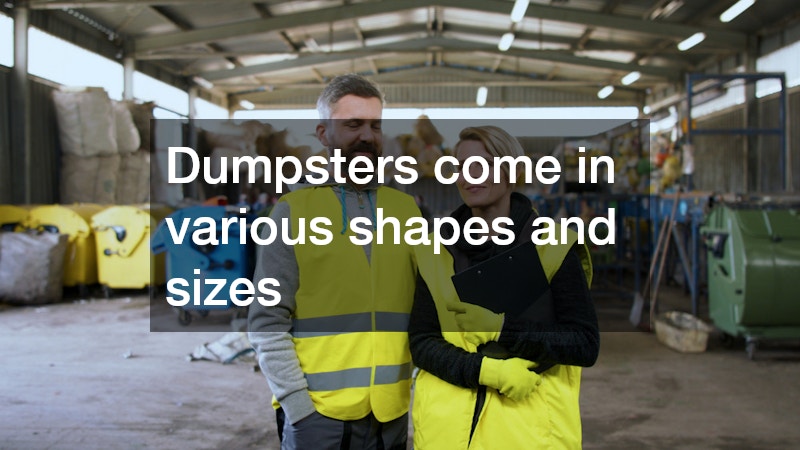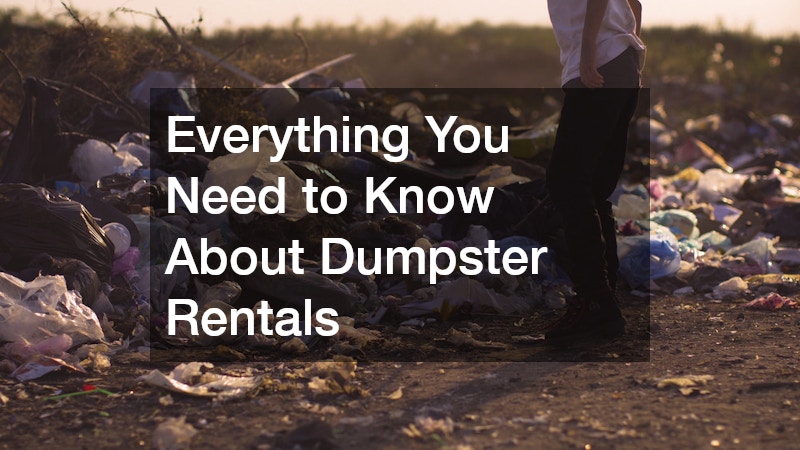Dumpster rentals provide a practical solution for waste management, especially in situations involving substantial cleanup. Whether you’re renovating your home, managing a construction site, or handling a large-scale event, renting a dumpster can streamline the waste disposal process. These rentals offer varying sizes and types to accommodate different needs, ensuring that you can efficiently dispose of debris and unwanted materials.
The flexibility of dumpster rentals makes them popular for both residential and commercial use. They can be rented for a short-term project or kept for longer periods if ongoing waste management is necessary. With a wide range of providers offering dumpster rentals, customers can choose options that best suit their project requirements and budgets.
It’s important to recognize the value of convenience and time-saving benefits provided by dumpster rentals. Instead of tackling waste disposal on your own, professional services ensure that waste is handled appropriately, complying with local regulations. Making the right choice in size and type of dumpster is crucial for maximizing the efficiency of your waste management efforts.
Understanding Different Types of Dumpsters
Dumpsters come in various shapes and sizes, each serving a unique purpose. Roll-off dumpsters are a common type used for temporary waste disposal projects like home renovations and cleanouts. These containers are designed to be delivered via a special roll-off truck and are available in sizes ranging from 10 to 40 cubic yards.
Front-load dumpsters, on the other hand, are typically used in commercial settings where regular waste disposal is required. These dumpsters are emptied into a garbage truck using a mechanical front-loading system, making them ideal for businesses generating consistent waste amounts. Companies often use these dumpsters to manage trash, recyclables, and other non-hazardous materials effectively.
Understanding the specific waste management needs of your project will help you decide on the right type of dumpster. Different projects and job sites require different approaches to waste disposal, and selecting the appropriate dumpster ensures a smoother and more efficient process. Consulting with a dumpster rental provider can offer insights into which type of dumpster best suits your needs.
Choosing the Right Size for Your Needs
Selecting the correct dumpster size is essential for optimizing your waste management plan. Sizes typically range from 10 to 40 cubic yards, with each size accommodating specific project scales. Small cleanup projects, such as garage cleanouts, might only need a 10-yard dumpster, while larger construction projects require something more substantial.
Overestimating or underestimating the size can lead to inefficient waste management and increased costs. If a dumpster is too small, you may need additional rentals, whereas a too-large dumpster results in wasted space and funds. Consulting with a rental company can provide guidance on the most cost-effective and operationally efficient size for your project.
Consider the type of waste and its volume when determining size requirements for dumpster rentals. The nature of the project may also influence size selection, as certain materials require more space due to their bulkiness. The goal is to ensure that all waste fits comfortably within the dumpster, allowing for safe and proper disposal.
Cost Factors and Considerations
The cost of dumpster rentals varies based on multiple factors, including size, rental duration, and location. Typically, larger dumpsters and longer rental periods incur higher costs. Additionally, local disposal fees and permit requirements can affect the overall price of renting a dumpster.
Understanding what influences pricing can help you budget effectively for your project. It is advisable to ask the rental company for a detailed breakdown of costs, including any hidden fees that might arise. By doing so, you can align your expectations with your budget, avoiding surprises during or after the rental period.
Some companies may offer flexible pricing plans or discounts for long-term rentals, which can be beneficial for ongoing projects. Negotiating rates and understanding all applicable fees upfront allows for better financial planning. It’s important to consider these financial aspects when planning for dumpster rentals to ensure that the chosen solution fits both the project’s needs and its budget.
Benefits and Best Practices for Dumpster Rentals
Utilizing dumpster rentals offers numerous benefits, such as efficient waste removal, easy scheduling, and compliance with environmental laws. Renting a dumpster ensures that waste materials are collected and disposed of in accordance with local regulations, reducing potential legal liabilities. This proper disposal keeps the environment clean and contributes to public health and safety.
Best practices for using dumpster rentals include correctly identifying the types of waste being discarded and ensuring no prohibited materials are included. Education on these best practices can prevent fines and protect the environment from hazardous waste materials. Communication with the rental provider about what can and cannot be disposed of ensures that you’re in compliance with service agreements.
Another key consideration is choosing the right location to place the dumpster for convenient access. Proper site preparation ensures that dumpsters do not obstruct traffic or violate property guidelines. By adhering to these practices, users can benefit from an organized, efficient, and eco-friendly waste management process when utilizing dumpster rentals.
In conclusion, understanding the intricacies of dumpster rentals can significantly ease the waste disposal process for many projects. By assessing your project’s specific requirements, you can select the right type and size of dumpster, ensuring optimal efficiency and cost-effectiveness. Furthermore, being informed about cost factors allows for better financial planning and aligns your rental decision with your budget.
As you plan your project, consider the benefits of dumpster rentals, such as convenient waste removal and environmental compliance. Following best practices and consulting with your rental provider can help maximize these benefits, preserving both your resources and the environment. These informed decisions translate into a smoother and more successful project execution.
Ultimately, making knowledgeable choices about dumpster rentals contributes to effective waste management solutions. By utilizing the right resources, you can ensure that your project remains on time, within budget, and environmentally responsible. Remembering the importance of proper waste disposal highlights the value of dumpster rentals in maintaining clean and sustainable communities.

